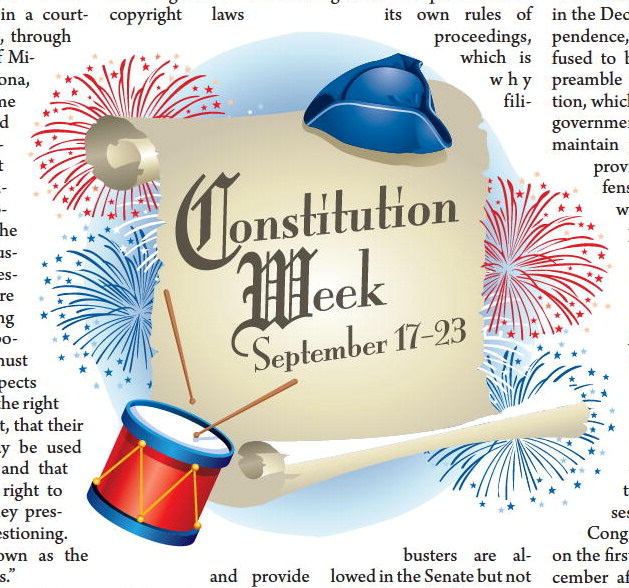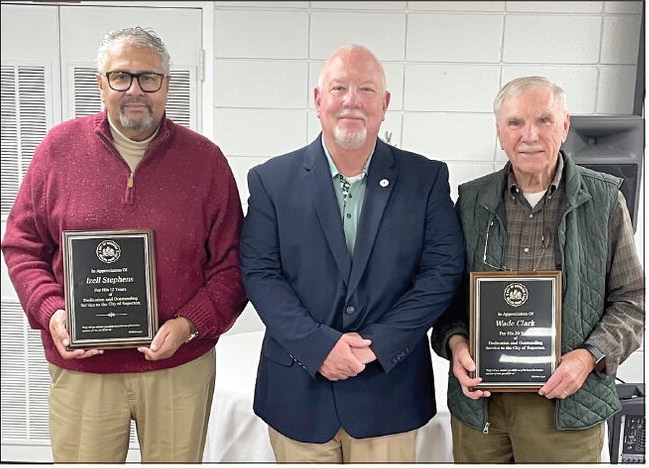Local DAR Celebrates Constitution Week


mrandolphadvance@gmail.com
The local Daughters of American Revolution (DAR) chapter is celebrating Constitution Week this week, September 17-23, by reminding the public of the Preamble to the Constitution and several facts about the historic document.
Constitution Week is celebrated throughout the nation beginning on September 17, which commemorates the signing of the document on September 17, 1787. During this week, citizens are encouraged to review the document and their nation in order to emphasize its importance.
Recently, the local DAR chapter provided several facts about the Constitution in order to help citizens learn more about this core legislation.
These facts include: Residents of the Dis trict of Columbia (Washington, D.C.) are able to vote in presidential elections even though the district is not a state and only has a nonvoting delegate in the House of Representatives. This right to vote for the president was granted in 1961 through the passage of the 23rd Amendment, which gave the district electoral votes equivalent to those of the least populated state.
e Constitution does not discuss the purchase of land from foreign nations. In 1803, when France offered to sell its claim to the vast Louisiana Territory to the United States, President Thomas Jefferson considered amending the Constitution to include this power.
After realizing that ratifying the amendment would take too long, Jefferson interpreted the original constitutional power to govern territories as implying the ability to purchase them.
The Senate then ratified a treaty with France for the Louisiana Purchase, as Article II, Section 2 of the Constitution gives the President the right to make treaties that are subject to approval by two-thirds vote of the Senate.
e Constitution does require states to provide attorneys for defendants who cannot afford to hire their own. In 1963, the Supreme Court decided in Gideon v. Wainwright that under the 6th Amendment, defendants charged with serious crimes have the right to have an attorney in state and federal courts. The 6th Amendment states, “In all criminal prosecutions, the accused shall enjoy the right to a speedy and public trial, by an impartial jury…to have compulsory process for obtaining witnesses in his favor, and to have the Assistance of Counsel for his defense.” In 1938, the Supreme Court ruled that the government must provide counsel for defendants in federal court trials who cannot pay for an attorney, but the Court did not extend this right to state trials until this decision. In 1972, through the ruling of Argersinger v. Hamlin, the Supreme Court extended these rights by specifying that a defendant found guilty of a misdemeanor or less serious crime cannot be sentenced to jail time unless offered an attorney at trial.
e 5th Amendment of the Constitution does not limit its protection of self-incrimination to testimony given in a courtroom. In 1966, through the decision of Miranda v. Arizona, the Supreme Court ruled that the safeguard against self- incrimination also applies when the police take suspects in for questioning. Before any questioning can begin, police officers must explain to suspects that they have the right to remain silent, that their statements may be used against them, and that they have the right to have an attorney present during questioning.
These are known as the “Miranda rights.”
e Constitution does not state that there must be 12 jurors on every jury, but rather that it should be an impartial jury. For many years, it was assumed that since the English had a tradition of 12-person juries at the time which the Constitution was adopted, the number was required.
However, in 1970, during the Williams v. Florida case, the Supreme Court called the distinction of 12 jurors a “historical accident,” and said that jury’s size could vary according to the seriousness of the crime.
e Constitution does not require the President to deliver a State of the Union address in person. In Article II, Section 3, of the Constitution, the president is only required “[to] give to the Congress information on the State of the Union [from time to time].” Presidents George Washington and John Adams delivered their State of the Union addresses in person, but President Thomas Jefferson discontinued the practice, and simply sent a written message to Congress. The practice of delivering the message in person returned in 1913, when Woodrow Wilson delivered his State of the Union address verbally.
Since then, most presidents have followed suit.
e Constitution does not allow states to require candidates for office to publicly declare their religious affiliations.
To ensure freedom of religion, Article VI of the Constitution forbids the requirement of any “religious test” as a qualification for any office or public trust. Public officials cannot be required to practice or pledge allegiance to any religion in order to hold office.
e 24th Amend ment of the Constitution prohibits poll taxes (a fixed tax levied on a citizen for the right to vote) in federal elections, but not state elections. However, in the 1966 ruling of Harper v.
Virginia Board of Elections, the Supreme Court decided that discrimination based on economic status violated the “equal protection clause” of the 14th Amendment. As a result, poll taxes are no longer permitted in either state or federal elections.
Inventors and au thors are protected by the Constitution through the legislation’s authorization of Congress to establish copyright laws and provide patent protection for these creators. In Article I, Section 8, Congress is given the right “to promote the Progress of Science and useful Arts, by securing for limited Times to Authors and Inventors the exclusive Right to their respective Writings and Discoveries.”
Patents are not limited to entirely new inventions, but can protect inventions that perfect existing items.
Thus, for example, in 1849, Charles Christman was granted a patent for a new form of flute that would improve the tone of the instrument.
Amendments to the Constitution do not require unanimous approval by Congress and the States. Article V of the Constitution specifies that an amendment becomes valid after it has gained the vote of two-thirds of each house of Congress and three-quarters of the states. States can ratify an amendment through a vote by their legislatures or by electing special conventions, as was done in 1933 to repeal the 18th Amendment (Prohibition) by enacting the 21st Amendment.
In 1971, the 26th Amendment was ratified to lower the voting age from 21 years old to 18 years old. This change came after the unpopular Vietnam War military draft caused the public to question why men between the ages of 18 and 21 were qualified to fight for their country, but not make decisions about war and peace.
Under Article I, Sec tion 5, of the Constitution, each house of Congress is granted the power to set its own rules of proceedings, which is why filibusters are allowed in the Senate but not the House of Representatives. The House is larger than the Senate because of membership reflecting the population of each state, causing the Congressional body to set rules that limit how long members can speak and reduce opportunities to block legislation coming to a vote. Because the Senate is smaller and represented by all states equally, the Congressional body has set rules to give minorities a greater voice, such as through filibusters, or unlimited debates. In these filibusters, the minority may prevent the holding of a vote where the majority would prevail. These filibusters may only be shut off by being approved by at least threefifths of the Senate.
Congresswoman Jea nette Rankin was able to serve in Congress before the ratification of the 19th Amendment (Women’s Suffrage), which banned states from denying women the right to vote, was adopted in 1920. This was possible because women were never prohibited from voting or serving in public offices by the Constitution; the decision of women’s rights to vote was left to be determined by each state. Several western states adopted women’s suffrage before the Constitutional amendment, including Rankin’s home state of Montana. Having been a leader in the movement to gain women’s rights to vote in her state, Rankin was elected to Congress in 1916.
e Constitution never declared that “all men are created equal.”
This statement is shared in the Declaration of Independence, but often confused to be a part of the preamble to the Constitution, which instead defines government as existing to maintain peace at home, provide national defense, promote the well-being of the people, and protect the people’s liberties.
ough the 20th Amendment did do away with most of the “lame duck” sessions in Congress – which are potential second sessions of every Congress that begin on the first Monday of December after the national election has been held and some standing members have been defeated or retired – it did not eliminate all of them. Originally, the term “lame duck” was applied to businessmen who went broke, but the term eventually evolved into political officeholders who were defeated. After the amendment was ratified in 1933 and moved the official opening date of Congress to January 3 and official beginning of a presidential term to January 20, “lame duck” sessions have been held occasionally, meeting for short periods to address unfinished business.
e Constitution does not designate a fixed term for Supreme Court Justices. Article III, Section 1, of the Constitution, states that justices of the Supreme Court and other federal judges “shall hold their offices during good behavior.” Justices can therefore serve for life or until they choose to retire. The only way to remove a Supreme Court justice is by impeachment by the House of Representatives and conviction by the Senate. In 1803, the House of Representatives impeached Justice Samuel Chase for behaving in an “arbitrary, oppressive, and unjust” manner on the bench, but the Senate did not convict him, allowing him to serve until his death in 1811.
In addition to these facts regarding the Constitution, the DAR also shared the Preamble of the Constitution, as the organization believes it is important that every American remember the purpose of government. The Preamble reads, “WE THE PEOPLE of the United States, in order to form a more perfect Union, establish justice, insure domestic tranquility, provide for the common defense, promote the general welfare, and secure the blessings of liberty to ourselves and our posterity, do ordain and establish this Constitution for the United States of America.”
The DAR concluded their emphasis on the importance of celebrating and learning about the Constitution by sharing “The American’s Creed” written by William Taylor Page in 1917. The Creed states, “I believe in the United States of America as a Government of the people, by the people, for the people whose just powers are derived from the consent of the governed; a democracy in a republic, a sovereign Nation of many sovereign States; a perfect Union, one and inseparable, established upon those principles of freedom, equality, justice and humanity for which American patriots sacrificed their lives and fortunes.
I therefore believe it is my duty to my country to love it; to support its Constitution; to obey its laws; to respect its flag; and to defend it against all enemies.”





